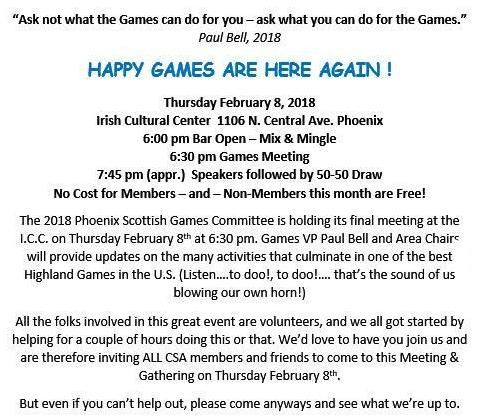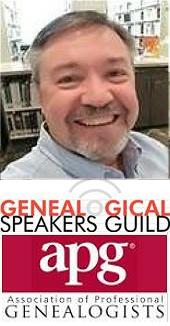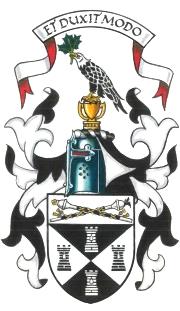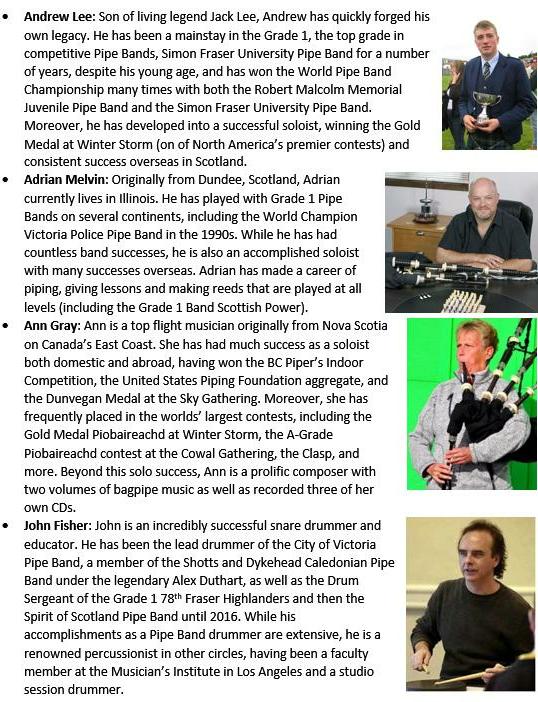|
| February 2018 |
|
|
February 8 Gathering

We will also have two featured speakers:
Local realtor and athlete Katy Horgan will recount her experiences
at the 2017 Scottish Masters Highland Games
World Championships in Iceland
Drum Major Kevin Conquest of the Mesa Caledonian Pipe Band
will give an informative talk on all things pipe band.
|
|
Letter from the Editor, Don Finch
.jpeg) Dear fellow Caledonians: Dear fellow Caledonians:
February – the Love Month! The month when some of us celebrate Valentine’s Day by the giving of candy, flowers, and much more. It is also the time when American citizens observe Black History Month, an annual celebration of achievements by black Americans. It is also the month when we celebrate diversity and culture of all people.
Here in Arizona, February is a great month to be outdoors walking, hiking, golfing, and taking in the start of MLB spring training. But its also the month when we in the Scottish community get ready for the greatest show on turf, the Phoenix Scottish Games, which begin the first weekend of March.
Games V.P. Paul Bell has issued an invitation to come to the February 8th ‘Games Gathering’ at the ICC for an update on each of the main activities, and to hear our two featured speakers – details in the accompanying announcement.
If this was a flashcard session and ‘Highland Games’ is on the card, what’s your active recall word? “caber”; “bagpipes”; “kilts”; “meat pies”; “clans”; “Scotch whisky”; ‘Highland dancing”; “British cars”; “Nessie” …. With any of those answers you’d pass the test!
 Back to the ‘Love Month’ theme for a moment. What does ‘Scotch ‘n Chocolate’ bring to mind? Well, if you’d like to find out more, there will be a seminar in the Whisky Lounge each afternoon hosted by Malt Master Eddie Sumpter and Chocolatier Denise McCreery. Back to the ‘Love Month’ theme for a moment. What does ‘Scotch ‘n Chocolate’ bring to mind? Well, if you’d like to find out more, there will be a seminar in the Whisky Lounge each afternoon hosted by Malt Master Eddie Sumpter and Chocolatier Denise McCreery.
So, stiff upper lip, carry on, be patient, get through February somehow – because we’re just a month away from the 54th Annual Phoenix Scottish Games – cannae wait! Slainte! Don
|
|
The Caledonian Society Burns Supper 2018
By Don Finch
The Society joined up with the Lady Claire Lodge of DOS to host a Burns Supper in Chandler. Over 150 attended - great haggis and merriment!
- Pipe Band
- Young Dancers
- Presenters
- Don & Linda
- Dancers
- Daughters
- Raffle
- Guests
|
|
Fuil Celtic Burns Supper
By Meredith Young
On January 27th, Fuil Celtic hosted its second annual Burns Night Supper at the Dubliner Pub. It was a night of friendship, good food and drink, and a celebration of all things Celtic. The Payson folk duo Cinnamon Twist, along with Scottish dancers under the leadership of Keri Maschino, provided toe-tapping entertainment.
After Pipe Major Len Wood led the procession of the haggis around the room, Eric Wells, president of Fuil Celtic, gave a rousing rendition of Robert Burns’ “Ode to A Haggis.”
.jpg) This ode is a comedic poem that personifies the haggis as a wee beastie to be hunted down and feasted upon. This ode is a comedic poem that personifies the haggis as a wee beastie to be hunted down and feasted upon.
Eric added a twist to the poem by including his personal research of the haggis, including our own local haggis hybrid, the Haggatort.
While people partook of the haggis, Shawn McFarland and Krystle Wells gave the customary “Toast to the Lassies” and “Reply to the Laddies” speeches and made the guests laugh with their witty commentary on the societal importance of men and women.
.jpg) Fundraising raffles are an important element of every Fuil Celtic event, and the selection of prizes was quite impressive. An array of decadent raffle baskets contained goodies such as bottles of scotch and gin, Celtic music CDs from the Wicked Tinkers and Traveller, books ranging from Robert Burns’ poetry to Celtic mythology to novels about Welsh history, and an array of delicious baked goods provided by a professional chef. Fundraising raffles are an important element of every Fuil Celtic event, and the selection of prizes was quite impressive. An array of decadent raffle baskets contained goodies such as bottles of scotch and gin, Celtic music CDs from the Wicked Tinkers and Traveller, books ranging from Robert Burns’ poetry to Celtic mythology to novels about Welsh history, and an array of delicious baked goods provided by a professional chef.
Through year-round raffles at monthly events, the Burns Supper itself, and a donation from the owner of the pub, Fuil Celtic raised $1,320 for its charity of the year, Pets for Vets. Pets for Vets is a non-profit organization that provides military veterans with animal companions to help them cope with the daily difficulties they face.
At the Supper, Eric Wells announced Rosie’s House as Fuil Celtic’s new charity for 2018. Rosie’s House is a musical education organization for underprivileged children.
Even though the Burns Supper was a great success, the members of Fuil Celtic never rest. They are already beginning to plan other events for this year and hope many more people will attend and learn about all things Celtic. For more information about upcoming events and raffles, visit the Fuil Celtic Facebook page or contact one of the group’s officers.
|
|
|
|
Meet the Members
We regularly share information about new members. Let's all welcome them to the Society.
.jpg) |
Dana Brown, an adventurous soul, made her way across the country from New Jersey to Arizona in August 2014.
She is an insurance agent, reflexologist and licensed aesthetician. In her spare time she enjoys traveling, reading, and volunteering. Dana is a volunteer with the American Cancer Society and the 2018 Highland Games |
.jpg) |
Jim Lagnese moved to Arizona in 2012 from Iowa, but was born, raised and lived on Long Island for 40 years.
While my surname is Italian, my mother’s heritage encompassed just about the whole UK and Ireland.My wife is the real Scot with the maiden name of Watt who got me interested in Scotland. I work at ASU as a System Support Analyst. |
|
|
Research Your Scottish Ancestry
|
|
 Church Records Church Records
by Robert M. Wilbanks IV, B.A.
Chief Genealogist & Historian, C.S.A.
genealogy@arizonascots.com
History has shown, for good and for bad, that religion is a significant part of the human experience. Since ancient times, people have always sought to understand their existence, the purpose of life, their relationship to the universe, and/or the idea of a greater being that created all that is known or understood. As people grew into communities, these communities grew to develop a common belief system that would grow into an entity of its own. Later, communities would separate and sub-communities would develop based upon varying viewpoints of religion. And wherever people created communities, bureaucracy would follow. This bureaucracy would create records that would become the basis of genealogy research.
We are now using a new method to display long articles.
The remainder of this article can be accessed using the tabs below.
The blue tab is open. Click on a gray tab to open it instead.
Each tab area has a scroll bar to the right.
Church Records Explained
Church records are among the very best genealogical sources available. Most significantly, church records date back well before the creation of civil registration of vital statistics and other records frequently used by genealogists, ie. birth, death and marriage records, etc. Unfortunately, church records are the most under-used sources in genealogy. Mostly, this is because it can be difficult to positively know what religion an ancestor followed, made more complicated by the existence of so many different denominations. Identifying and locating the many various church records can appear to be a daunting task to the average genealogist, but it can be well worth the effort.
Church records can vary significantly in types of information they provide. This is generally determined by the basic theology and social role of each denomination. In addition, church records will vary in existence and content from country to country depending on whether the church was the state-church or a “free” church. In a state-church, the clergy was a semi-public official who not only kept records for the church, but also specifically kept vital records for the government. In a “free” church, the clergy only kept records as necessitated by the theology of the church, which may not include vital records. Thus, church record-keeping systems transcended national and religious boundaries.
Some History
The histories and establishment of churches in Europe would have a great effect on the establishment and record-keeping of churches in America. The variety of immigrant groups and religious preferences made the early establishment of a state-church in America difficult. Based on this fact, America’s “Founding Fathers” later created the separation of church and state in the Constitution. In America, not only would there be a greater number of different denominations, and creation of new denominations during the “Great Awakening” after the American Revolution, but there would also be a great separation within denominations according to ethnicity; the Irish Catholics attended a different church than the German and French Catholics in the same community.
Generally, most church records are not unlike civil records, though with some differences. Especially in the case of birth, marriage and death records. For example, churches would record the infant baptism or christening with the date of the event, but may include the date of birth as well as the names of parents, grandparents and other key information. Instead of deaths, the church recorded the burial, though possibly including the actual date of death, as well as other information.
Though christenings, marriages and burials are the most important and widely used of church records, they are by no means the only types of records kept by the churches. They also kept membership lists, including admissions, dismissals, transfers, and other records tracking the movements of members. There are also church minutes, vestry books, ministers returns, registers, records of church social groups, the church cemetery records, and a wide variety of other church business records.
As mentioned earlier, the only difficulty with church records are the great numbers of denominations and churches, leaving an over-abundance of records. To help narrow the research in church records, it is important to determine what denomination that a family belonged to, and identify a specific church in the community the family lived. Then, determine whether the church still exists and has its records, or where the records are currently kept and whether available for research. Books such as The Source: A Guidebook of American Genealogy, available at any public library as well as genealogy library, or now available full-text openly on Ancestry.com, has more detailed information regarding church records and research, and can identify the many denominations, their archives and records repositories including addresses and contact information. Many denominations have archives and repositories in each state as well as a national archives, and they can help provide information as to the existence and availability of churches and records, and sometimes research assistance.
Christianity came to Scotland in the 6th century. The church in Scotland was intermixed between Rome and England until 1192 when it became an independently recognized Church, separated from York and Canterbury, answerable directly to Rome and the Pope. Administration of the church in Scotland was run by a council until 1472 when St. Andrews became the first Archdiocese of Scotland, followed by Glasgow. Then, the Reformation came to Scotland in 1559 with the leader John Knox. By August of 1560, after a series of conflicts that included English and French forces, the Scottish Parliament met and approved a Reformed Confession of Faith, abolishing the old faith and leading to the establishment of The Kirk, the Presbyterian, Church of Scotland.
Other denominations of historical significance in Scotland, though rare, include the Baptists, Congregationalists, Huguenot Protestants, Jews, Methodists, Moravians, Mormons, Palatine Protestants, and Quakers. These churches as a group were often referred to as “nonconformists”.
Using church records for Genealogy
However, no matter what religion an ancestor was, it is suggested to always look into the records of the Church of Scotland denoted as the “Old Parochial Registers (OPR)” and also the “Kirk Sessions” Records. The FamilySearch wiki page “Scotland Church Records” will help explain what records are available and where to find them.
Meanwhile, many records are slowly being indexed, abstracted, transcribed and published by historical and genealogical societies. A wealth of information is constantly being made available. Also, churches often publish anniversary histories, and many of their records have been microfilmed and are available from the Family History Library in Salt Lake City through its local branch centers. Meanwhile, now with the Internet, information is becoming more easily accessible and available faster.
This is another of a series of articles in which I show you the basics of searching for your family history, discussing the use of family records, public records, and online resources nationally and internationally, etc. The previous articles are now available on the Genealogy Section of this website. See “Genealogy” in the menu options at the top of the web page.
|
|
New Armiger in Arizona
.JPG) Congratulations are in order to Society member Kevin Conquest. Congratulations are in order to Society member Kevin Conquest.
Kevin traveled to Edinburgh, Scotland in September to receive a grant of ensigns armorial from the Lord Lyon - Scotland’s heraldic authority on behalf of Her Majesty Queen Elizabeth II, for significant contributions to the Scottish diaspora.
Heraldry is something celebrated for centuries and originated from European nations. The original purpose was to uniquely identify armored knights in the field. The term “coat of arms” comes from the surcoat worn over the armor. This blouse would be adorned with the colors and charges (features) of the knight. With the advent of tournaments in the medieval era, this practice grew elaborate with crests added to the knight’s helmet, made of wood or leather.
 All components of an armorial achievement have specific meaning. In Scottish arms, canting (the art of visual puns) is a popular practice. Kevin’s arms utilize the same silvery-white and black colors of his ancestor Sir John Conquest who was a Knight of the Bath in 1306. The four towers are a pun on the Conquest surname but signify four pursuits in Kevin’s life. The crossed drum majors’ maces in chief are adorned with a crown and eagle, signifying his pipe band contributions to the Commonwealth and the United States. Above the knight’s helm is an American bald eagle on a trophy, once again a pun on the name referencing competitive victories at highland games, with the eagle signifying that his branch of the Conquest family settled in the USA. In the beak of the eagle is a sprig of holly, borrowed from the holly tree crest of Sir John Conquest. All components of an armorial achievement have specific meaning. In Scottish arms, canting (the art of visual puns) is a popular practice. Kevin’s arms utilize the same silvery-white and black colors of his ancestor Sir John Conquest who was a Knight of the Bath in 1306. The four towers are a pun on the Conquest surname but signify four pursuits in Kevin’s life. The crossed drum majors’ maces in chief are adorned with a crown and eagle, signifying his pipe band contributions to the Commonwealth and the United States. Above the knight’s helm is an American bald eagle on a trophy, once again a pun on the name referencing competitive victories at highland games, with the eagle signifying that his branch of the Conquest family settled in the USA. In the beak of the eagle is a sprig of holly, borrowed from the holly tree crest of Sir John Conquest.
Above all else is the motto – ET DUXIT MODO – “And he led the way.”
|
| |
|
Piping Judges for the Games
by Alasdair Martin
For those who have kept track of the Piping portion of the Phoenix Scottish Games in the recent past, one will notice there have been many changes. To start, this year’s judging panel are not isolated to the American Southwest.
Two are from Vancouver, British Columbia (Andrew Lee and John Fisher), one from Calgary, Alberta (Ann Gray), and one from Chicago, Illinois (Adrian Melvin).
Those in the piping will recognize these names as some of the top adjudicators in North America. Here is a brief introduction to each of them:

|
|
COMING EVENTS and Highland Games in Arizona and Nearby
Games Calendar compiled by Clan Campbell Society NA
| February 8 |
Games/Volunteer Gathering at the ICC |
| February 17/18 |
Queen Mary Scottish Festival (Long Beach CA) |
February 24
.jpg) |
Top Golf Gilbert, 1689 S. Santan Village Pkwy | Gilbert
9 AM-12 PM -$50/Person. Register by Monday February 19 at mcpb.org/topgolf
Join Mesa Caledonian at Top Golf for a morning full of golfing, tartans, and more! Admission includes 3 hours of fun and competitive golf games for all ages, plus an all-you-can-eat brunch buffet. A portion of proceeds benefit the programs of the Mesa Caledonian Pipe Band, a 501(c)3 Non-Profit Organization. |
| March 3/4 |
Phoenix Scottish Games HERE |
|
|
Caledonian Society Officers
|
|
Membership Renewal Reminder
Membership Special for New Members joining for 2018:
- - $25.00 single and $40.00 Family (at the same address)
It's easy - just jump to the Membership Page for the form.
And you can pay by Credit Card at our On-Line Store descibed at the left.
Society Gatherings
Regular membership gatherings are usually held the second
Thursday of each month, many at the Irish Cultural Center,
1106 N. Central Ave., Phoenix - others around the Valley - usually beginning at
6:30 pm. Please check our website for further details.
|
|
|
|
|